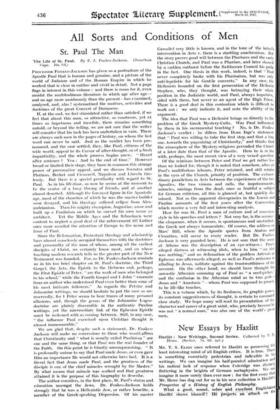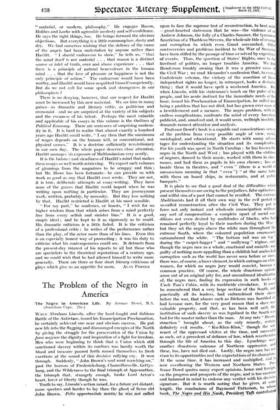New Essays by Hazlitt Hazlitt : New Writings, Second Series.
Collected by P. r.
Howe. (Seeker. 7s. net.)
Mg. T. S. ELIOT once referred to Hazlitt as possessing tile least interesting mind of all English critics. It is true. Them is something essentially pedestrian and inflexible in Id' writings. We can imagine his half-puzzled admiration his radical lack of response when Coleridge was divinel) fluttering in the heights of German metaphysics. We can imagine it more surely than ever now : for the first essay that Mr: Howe has dug out for us in his new collection is lIszlites Prospettus. of a History. of English Philosophy.
What a good, sound, sober and excellent Englishnuk
HazIftl attack on the
"material, or modern, philosophy." He engages Bacon, Hobbes and Locke with agreeable modesty and self-confidence..
He says the right things, too. Hc brings forward the obvious objections. But everything is a little commonplace, dusty and dry. We find ourselves wishing that the defence of the cause of the angels had been undertaken by anyone rather than Hazlitt. " I should endeavour to show," he tells us, "that the mind itself is not material . . . that reason is a distinct source or inlet of truth, over and above experience . . . that there is a principle of natural benevolence in the human mind . . . that the love of pleasure or happiness is not the only principle of action." The endeavour would have been worthy, and Hazlitt would have acquitted himself competently. But do we not call for sonic spark and strangeness in our philosophers ?
There is no denying, however, that our respect for Hazlitt must be increased by this new material. We see him in many guises—as dramatic and literary critic, as politician and economist-- and we are surprised at the variety of his subjects and the evenness of his talent. Perhaps the most valuable and applicable of his essays in this volume is the Outlines of Political Economy. There are sentences of surprising modern- ity in it. It is hard to realize that almost exactly a hundred years ago Hazlitt could write, "I say then that the maximum of wages depends on the human will, or conventional, not physical causes." It is a doctrine sufficiently revolutionary in our own day. The whole paper deserves close attention. Hazlitt manages his exposure of Malthusianism very neatly.
It is the balance and steadiness of Hazlitt's mind that makes these essays so well worth retrieving. We expect such volumes of gleanings from the magazines to be scrappy and thin ; but Mr. Howe has been fortunate—he can provide us with NVork as good as any that Hazlitt ever wrote. They are not, it is true, deliberate attempts- at essay-writing. They have none of the graces that Hazlitt could import when he was writing upon nothing in particular. They are journeyman work, written, probably, by necessity. But they lose nothing by that. Hazlitt restricted is Hazlitt at his most sensible.
"For my part," he confesses, or boasts, "I wish for no higher wisdom than that which arises from a mind perfectly free from every selfish and sinister bias." It . is a good, simple ideal ; and he kept to it as rigorously as he could. His dramatic criticism is a little faded. It is the criticism of a professional critic : he writes of the performance rather than the play, of the actor more than of his lines. Even this is an especially honest way of proceeding ; it was his duty to criticize what his contemporaries could see. It detracts from the present-day interest of his reports to all but those who are specialists in the theatrical reputations of a century ago, and we could wish that he had allowed himself to write more generally. There are three or four short literary criticisms. of plays which give us an appetite for more. ALAN PORTER































































 Previous page
Previous page